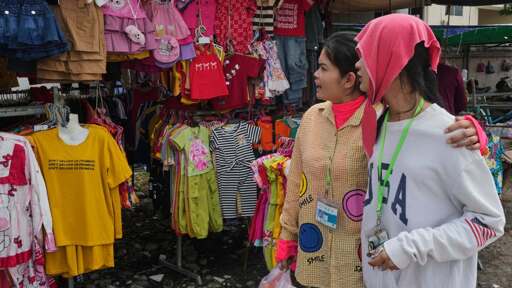NEW YORK (AP) — Sending children back to school in new sneakers, jeans and T-shirts is likely to cost U.S. families significantly more this fall if the bespoke tariffs President Donald Trump put on leading exporters take effect as planned, American industry groups warn.
About 97% of the clothes and shoes purchased in the U.S. are imported, predominantly from Asia, the American Apparel & Footwear Association said, citing its most recent data. Walmart, Gap Inc., Lululemon and Nike are a few of the companies that have a majority of their clothing made in Asian countries.
Those same garment-making hubs took a big hit under the president’s plan to punish individual countries for trade imbalances. For all Chinese goods, that meant tariffs of at least 54%. He set the import tax rates for Vietnam and neighboring Cambodia at 46% and 49%, and products from Bangladesh and Indonesia at 37% and 32%.
Working with foreign factories has kept labor costs down for U.S. companies in the fashion trade, but neither they nor their overseas suppliers are likely to absorb new costs that high. India, Indonesia, Pakistan and Sri Lanka also got slapped with high tariffs so aren’t immediate sourcing alternatives.



The problem is, this is the one industry I don’t mind the tariffs for, really.
Firstly, the loss of plentiful textile jobs in America has reduced our potential labor pool significantly. Second, the labor standards in these nations are often well below what I’d call acceptable; and the only way to change that is to sharply reduce what we import from them and try to get some level of ethics involved.
Maybe a saner politician, after the midterms in 2026, will be able to use this to push regulations on US companies to ensure that all labor done for goods imported to the US is maintained at US wages and levels of safety and worker protection equal to our onshore workers. Instead of blanketing the nation with a tariff, make the companies responsible for the welfare of their employees (and the ethics of any material produced in their name). Plus, if they’re forced to show that they’ve paid US-equivalent wages to every foreign employee, they’ll be more inclined to move the labor on-shore, since the transportation costs will start to hurt. Of course, the current crop of corpocrats won’t do that, but maybe someone will.
There’s a lot of things where small, well calculated and negotiated tariffs raised up over time and with advance notice and investment, would be beneficial to the economy, human rights, and the environment.
Blanket tariffs are always bad and this clown doesn’t know squat.